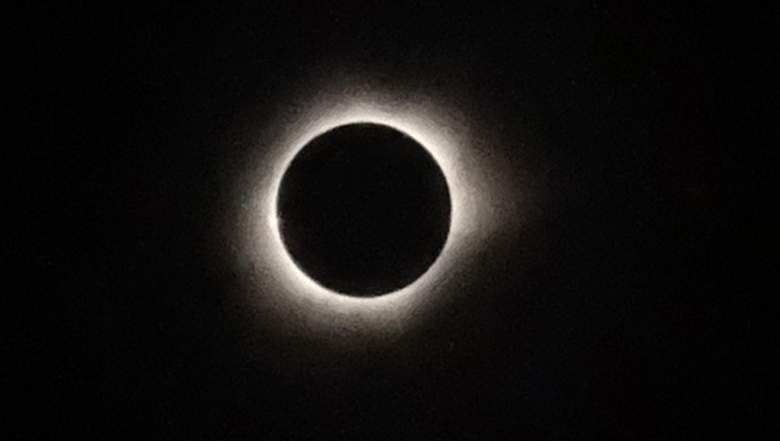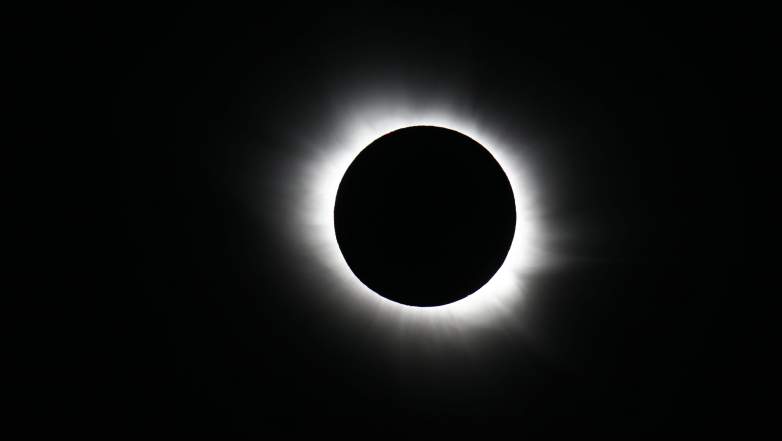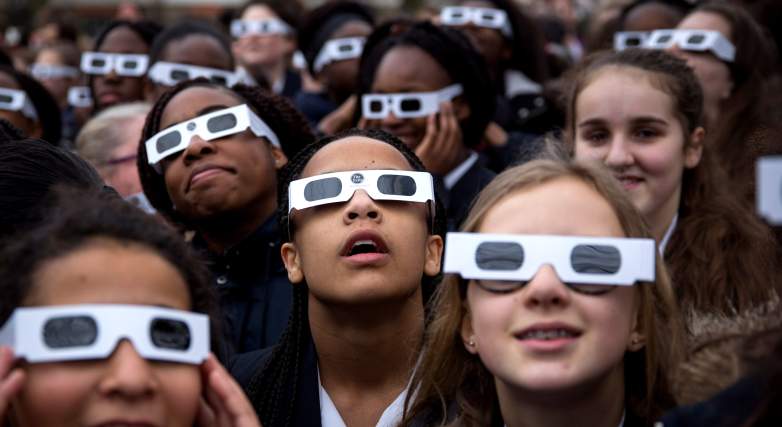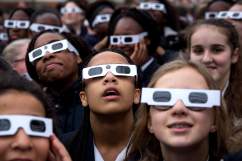
Getty A total solar eclipse is pictured from the city of Ternate, in Indonesia's Maluku Islands, on March 9, 2016.
The solar eclipse of 2017, which arrives on August 21, 2017, has a lot of people wondering whether it’s dangerous. One question a lot of people have been asking is whether the eclipse is dangerous for pregnant women.
Is it? Does the solar eclipse pose any dangers for pregnant women?
The connection between the solar eclipse and pregnancy has been a longstanding myth. USA Today reports that “Aztecs believed a lunar eclipse was a result of a bite being taken out of the moon. This idea translated into the Mexican superstition that if a pregnant woman viewed an eclipse, a bite would be taken out of her unborn child’s face. Hindu text credits the eclipse to the head of the demon Rahu, who ate the moon or sun.”
Sounds pretty scary. Is it true? Depends if you believe legends, which advise pregnant women not to do a host of things during a solar eclipse, including going outside, eating, and wearing metal objects. There isn’t science backing it up, with the exception that a lot of the instructions in the legends make sense for anyone during a solar eclipse, pregnant or not. Superstitions surrounding pregnant women and the solar eclipse were found in many cultures, though. According to MomJunction, “Scientifically, there has been no evidence to prove that eclipse (both lunar and solar) can be harmful during pregnancy.”

GettyA total solar eclipse can be seen in Svalbard, Longyearbyen, Norway, on March 20, 2015.
Still, the various cultures with superstitions surrounding pregnant women and eclipses may be onto something. For example, advice about not going outside and looking at the sun makes sense for everybody.
LifeCell provides a list of things that some cultures urge pregnant women not to do during an eclipse, including:
- Going outside, especially with the naked eye. (Violating this tip was said to cause deformities.)
- Using a knife or sharp metal objects (said to cause cleft lip and birthmarks if you do.)
- Cooking and eating food or drinking water.
Women were advised to do the following, according to LifeCell:
- Avoid work and get rest.
- Cover windows with thick curtains.
- Take a bath after the eclipse.
The solar eclipse will be the first since 1979 in the United States. “A total solar eclipse occurs when the moon passes between the sun and the Earth. The moon appears to completely cover the disk of the sun. By blocking the sun’s light, the moon casts a shadow that turns day into an eerie twilight here on Earth,” USA Today explains.
NASA deals with the pregnancy issue on its misconceptions page, dealing with the belief that “if you are pregnant you should not watch an eclipse because it can harm your baby.”
According to NASA, “This is related to the previous false idea that harmful radiations are emitted during a total solar eclipse. Although the electromagnetic radiation from the corona, seen as light, is perfectly safe, there is another form of radiation that travels to Earth from the sun. Deep in the solar interior where nuclear fusion takes place to light the sun, particles called neutrinos are born, and zip unimpeded out of the sun and into space. They also pass through the solid body of the moon during the eclipse and a second or so later reach Earth and pass through it too! Every second, your body is pelted by trillions of these neutrinos no matter if the sun is above or below the horizon. The only consequence is that every few minutes a few atoms in your body are transmuted into a different isotope by absorbing a neutrino. This is an entirely harmless effect and would not harm you, or if you are pregnant, the developing fetus.”
This is related to the previous false idea that harmful radiations are emitted during a total solar eclipse. Although the electromagnetic radiation from the corona, seen as light, is perfectly safe, there is another form of radiation that travels to Earth from the sun. Deep in the solar interior where nuclear fusion takes place to light the sun, particles called neutrinos are born, and zip unimpeded out of the sun and into space. They also pass through the solid body of the moon during the eclipse and a second or so later reach Earth and pass through it too! Every second, your body is pelted by trillions of these neutrinos no matter if the sun is above or below the horizon. The only consequence is that every few minutes a few atoms in your body are transmuted into a different isotope by absorbing a neutrino. This is an entirely harmless effect and would not harm you, or if you are pregnant, the developing fetus.
USA Today notes, “It’s believed pregnant women who are in the presence of the eclipse could cause their baby to have facial deformities or birth marks,” however there’s no scientific proof of this. Still, NASA urges all people, whether pregnant or not, to avoid looking directly at the sun, whether during a social eclipse or not. It can cause serious eye damage. That’s a fact, not a legend. (NASA has an entire page devoted to solar eclipse safety. You can read it here.)

Getty
In another example, MomJunction notes that some cultures advise pregnant women not to eat, drink or cook during an eclipse. Again, this could have some grounding in common sense. “Due to the sun being blocked, its rays too get blocked. As a result, there is a sudden drop in temperature. This temperature drop and missing sun rays cause microbes, bacteria and harmful germs to rise. This is said to affect food items and almost every perishable item for that matter,” MomJunction explained.
Some ancient astrological belief systems urge pregnant women not to wear metal and to sleep during the eclipse.
LifeCell said there are many things pregnant women in India are not supposed to do during a solar eclipse. “Pregnant women are advised not to come outside, eat or cook during a solar and lunar eclipse because people believe that it may have side effects on the growing baby,” the site reports.
The St. Louis Post Dispatch quoted David Baron, author of “American Eclipse,” as saying the Indonesian government even advised “pregnant women to stay indoors during a solar eclipse,” but no longer does. Avoiding sharp objects, taking a bath when it’s over, and covering windows were other suggestions for pregnant women during eclipses in some cultures, according to the newspaper.
Of course, the best suggestion for any pregnant women with concerns about her health or the solar eclipse is to check with her doctor.
